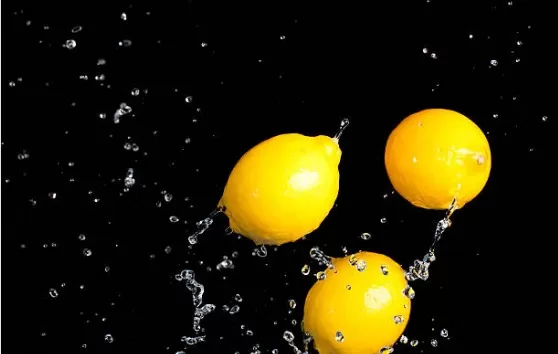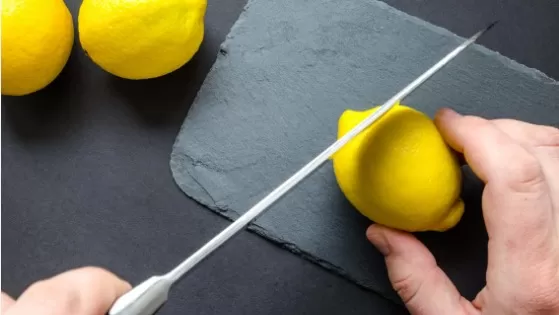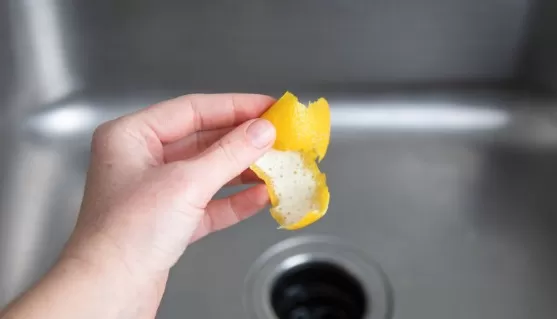Unleash the power of lemons beyond their tart flavor. Discover the clever and practical uses of this natural sour wonder for various household tasks. From cleaning to freshening, slice up some lemons and explore the versatile solutions they offer. Embrace the brilliance of lemons in your everyday life.
Bring Back the Shine: Easy Brass Derusting with Lemon Juice

Brass items are prone to tarnishing over time, but there’s no need to resort to harsh and toxic polishes to restore their shine.
A simple solution can be found right in your kitchen. By using lemon juice, you can easily derust and revitalize brass items without the need for harmful chemicals.
Here’s a quick and effective method to bring back the shine to your tarnished brass.
Lemon juice as a natural derusting agent: Lemon juice contains citric acid, which acts as a gentle and natural derusting agent for brass.
The acidic properties of lemon juice help break down the tarnish and restore the original shine of the metal.
Steps for derusting brass with lemon juice:.
a.Prepare the lemon juice: Squeeze fresh lemon juice into a small bowl. You can also use bottled lemon juice if fresh lemons are not available.
b.Apply the lemon juice: Dip a soft cloth or sponge into the lemon juice and gently rub it onto the tarnished brass surface. Make sure to cover the entire area affected by tarnish.
c.Let it sit: Allow the lemon juice to sit on the brass for a few minutes to let the acidity work on the tarnish. This will help loosen and dissolve the tarnish.
d.Scrub and wipe: Use a soft-bristled brush or toothbrush to gently scrub the tarnished areas. The tarnish should start to loosen and come off.
Continue scrubbing until the desired level of shine is achieved. Then, wipe the brass item with a clean cloth to remove any remaining lemon juice and tarnish residue.
e.Rinse and dry: Rinse the brass item with water to remove any lemon juice residue. Finally, dry it thoroughly with a soft cloth to prevent water spots or new tarnish from forming.
Caution for brass-plated items: If your item is brass-plated rather than solid brass, avoid using lemon juice as it may damage the plating.
Instead, clean brass-plated items with a mild soap and water solution, using a soft cloth or sponge to gently clean the surface.
By utilizing the natural power of lemon juice, you can easily and safely derust your brass items at home.
Remember to always test the method on a small, inconspicuous area first to ensure it doesn’t cause any adverse effects.
Regular maintenance and prevention can also help reduce tarnishing on brass items.
Keep them clean and dry when not in use, and consider applying a protective coating, such as a clear lacquer or wax, to slow down the tarnishing process.
With this simple and natural method, you can bring back the shine to your tarnished brass items and enjoy their renewed beauty without the use of toxic polishes or chemicals.
Restore the Gleam: Revive Chrome with Lemon for a Polished Look
Chrome fixtures and surfaces can lose their shine over time due to the accumulation of limescale and other residues.
However, you don’t need harsh chemicals or expensive cleaners to restore the sparkle to your chrome. With the help of a common kitchen ingredient—lemon—you can easily polish chrome and bring it back to its showroom-new appearance. Here’s a simple and effective method to revitalize cloudy chrome using the power of lemon.
Lemon as a natural chrome polisher: Lemon’s acidic properties make it an excellent natural cleaner for chrome.
The citric acid in lemon helps break down limescale, mineral deposits, and grime, revealing the gleaming surface underneath.
Steps to polish chrome with lemon: a.
Cut a fresh lemon: Slice a fresh lemon in half. You can also use bottled lemon juice if fresh lemons are not available, although fresh lemons tend to be more effective.
b. Apply lemon juice: Squeeze the lemon or pour some lemon juice onto a soft cloth or sponge.
Use the cloth or sponge to apply the lemon juice directly onto the cloudy chrome surface. Ensure that the surface is thoroughly coated with lemon juice.
c. Gently scrub: Use the lemon-coated cloth or sponge to gently scrub the chrome surface.
Pay special attention to areas with limescale or stubborn stains. The acidity of the lemon juice will help dissolve and remove the buildup.
d. Rinse and dry: Once you have scrubbed the chrome thoroughly, rinse the surface with water to remove any lemon residue.
Finally, dry the chrome with a clean cloth to prevent water spots and bring out its natural shine.
Additional tips:.
For more stubborn stains or limescale buildup, you can create a paste by mixing lemon juice with baking soda.
Apply the paste to the affected areas, let it sit for a few minutes, and then gently scrub with a soft cloth or sponge.
To prevent future buildup, wipe down chrome surfaces regularly with a damp cloth or sponge.
This will help remove any water spots or residues before they have a chance to accumulate.
Caution: Lemon juice may have a mild bleaching effect on certain colored or painted chrome surfaces.
Always test the lemon juice on a small, inconspicuous area first to ensure it doesn’t cause any discoloration or damage.
By harnessing the natural cleaning power of lemon, you can easily polish and revive your chrome fixtures and surfaces.
Enjoy the renewed shine and luster of your chrome without the need for harsh chemicals or expensive cleaners.
Remember to always practice proper maintenance and cleaning routines to keep your chrome looking its best.
Regular wiping and drying after use will help prevent limescale and residue buildup, ensuring that your chrome maintains its gleaming appearance for years to come.
Keep Bugs at Bay: Create an Insect-Resistant Outdoor Paint with Lemon

When painting outdoors, dealing with pesky insects buzzing around can be a real nuisance.
However, there’s a simple and natural solution to keep bugs away from your painting project. By adding a few drops of lemon juice to your can of paint, you can create an insect-resistant outdoor paint.
Bugs are repelled by the zesty scent of lemon, creating a citrus forcefield around your paint. Here’s how you can easily implement this trick to deter insects while painting outside.
Lemon juice as a natural insect repellent: Lemon has a strong scent that insects find unpleasant.
The aroma of lemon acts as a natural deterrent, helping to keep bugs away from your paint.
Steps to make insect-resistant outdoor paint: a.
Prepare your paint: Before opening your can of paint, have a fresh lemon ready for juicing. b.
Squeeze lemon juice: Cut the lemon in half and squeeze a few drops of lemon juice directly into the can of paint. The exact amount may vary depending on the size of the can and personal preference.
Start with a small amount and add more if desired. c.
Mix the paint: Stir the paint thoroughly to ensure that the lemon juice is evenly distributed throughout the can. d.
Start painting: Begin your outdoor painting project as usual, using the insect-resistant paint. The zesty scent of lemon will help repel bugs, keeping them away from the painted surfaces.
Additional tips:.
If you prefer not to squeeze lemon juice directly into the paint can, you can create a lemon-infused spray.
Mix lemon juice with water in a spray bottle and lightly mist the surrounding area before and during painting. This will help create a lemon-scented barrier that bugs will avoid.
Keep in mind that the effectiveness of lemon as an insect repellent may vary depending on the type of bugs in your area.
While it can help deter many insects, some persistent pests may still be attracted to the painting process.
Caution: Lemon juice may have a mild bleaching effect on certain types of paint or surfaces.
Always test the lemon-infused paint or spray on a small, inconspicuous area first to ensure it doesn’t cause any discoloration or damage.
By incorporating the natural repellent properties of lemon, you can make your outdoor paint project more enjoyable by keeping bugs away.
Embrace the power of lemon and enjoy a buzz-free painting experience without the need for harsh chemicals or synthetic insect repellents.
Remember to follow proper painting techniques and Safety Precautions while working outdoors.
With this simple lemon trick, you can create an insect-resistant paint that not only enhances the aesthetics of your outdoor space but also provides a bug-free environment to enjoy.
Brush Rejuvenation: Revitalize Paintbrushes with a Lemon Juice Soak
Over time, paintbrushes can become stiff and lose their flexibility, making them less effective for future painting projects.
However, there’s a simple and natural way to revitalize your paintbrushes and bring their bristles back to life. By giving them a hot soak in lemon juice, you can restore their softness and shape. Here’s a step-by-step guide on how to revitalize your paintbrushes using a lemon juice soak.
Lemon juice as a brush reviver: Lemon juice contains natural acids that help break down paint residues and restore the softness and flexibility of paintbrush bristles.
Steps to revitalize paintbrushes with a lemon juice soak: a.
Boil lemon juice: Pour a few cups of lemon juice into a pot and bring it to a boil. You can use freshly squeezed lemon juice or bottled lemon juice.
b. Simmer the brushes: Once the lemon juice reaches a boiling point, reduce the heat and let it simmer.
Gently place the stiff paintbrushes into the simmering lemon juice solution, making sure the bristles are fully submerged. c.
Soak for 15 minutes: Allow the paintbrushes to soak in the lemon juice solution for about 15 minutes. The heat and acidity of the lemon juice will help loosen any dried paint and soften the bristles.
d. Rinse and reshape: After the soaking time, remove the brushes from the lemon juice solution and rinse them thoroughly with warm water.
Use your fingers to reshape the bristles and ensure they regain their original form. e.
Dry the brushes: Gently squeeze out any excess water from the brushes and lay them flat or hang them upside down to air dry. Avoid using a hairdryer or any direct heat source, as it can damage the bristles.
Additional tips:.
For brushes with particularly stubborn paint buildup, you can use a brush comb or your fingers to gently remove the softened paint residues during the rinsing process.
If you don’t have lemon juice, you can substitute it with White Vinegar, which also has acidic properties that can help revitalize paintbrushes.
Caution: Take care not to let the lemon juice boil for too long, as prolonged exposure to heat can damage the bristles.
Additionally, ensure that the pot and lemon juice solution are cool enough to handle before removing the paintbrushes.
By giving your paintbrushes a rejuvenating lemon juice soak, you can bring them back to life and ensure optimal performance for future painting projects.
Enjoy the flexibility and softness of your revitalized brushes, all thanks to the natural power of lemon.
Remember to clean your paintbrushes thoroughly after each use to prevent paint buildup and prolong their lifespan.
With proper care and the occasional lemon juice soak, your paintbrushes will be ready to tackle many painting projects with ease.
Spotless Glass: Remove Paint Specks with Hot Lemon Juice

Painting around glass surfaces can be challenging, and occasionally, small specks of paint may accidentally end up on the glass.
However, there’s a simple and natural solution to remove these paint specks and restore the glass to its original, spotless state. By applying hot lemon juice and following a few steps, you can easily eliminate paint specks from glass surfaces.
Here’s a step-by-step guide on how to despeckle glass using hot lemon juice.
Hot lemon juice for paint removal: Lemon juice, with its natural acidity, can help break down and loosen paint, making it easier to remove from glass surfaces.
Steps to despeckle glass with hot lemon juice:.
a.Prepare the lemon juice: Squeeze fresh lemon juice into a heat-resistant container, ensuring that you have enough to cover the affected area.
b.Heat the lemon juice: Warm the lemon juice by microwaving it or heating it on the stovetop until it is hot but not boiling. Take care not to overheat the lemon juice.
c.Apply the hot lemon juice: Using a brush or sponge, apply the hot lemon juice directly onto the paint specks on the glass. Ensure that the affected area is thoroughly coated with the lemon juice.
d.Let it sit: Allow the hot lemon juice to sit on the paint specks for a few minutes. The acidity of the lemon juice will work to break down the paint.
e.Scrape off the paint: After the lemon juice has had time to work, carefully scrape the paint specks off the glass using a plastic scraper or a razor blade held at a slight angle. Be gentle to avoid scratching the glass surface.
If needed, reapply the hot lemon juice and repeat the scraping process until all the paint is removed.
f.Clean and rinse: Once the paint specks are removed, clean the glass with a glass cleaner or a mixture of water and mild Dish Soap. Rinse the glass thoroughly to remove any residue from the lemon juice.
Additional tips:.
Test the hot lemon juice on a small, inconspicuous area of the glass before applying it to the painted specks to ensure that it doesn’t cause any damage or discoloration.
For stubborn paint specks, you can gently scrub the area with a soft-bristled brush or a toothbrush dipped in the hot lemon juice before scraping.
Caution: Take caution when using a razor blade or any scraping tool to avoid injury.
Hold the blade at a slight angle and apply gentle pressure to avoid damaging the glass.
By utilizing the power of hot lemon juice, you can effectively remove paint specks from glass surfaces and restore their pristine appearance.
Enjoy spotless glass without the need for harsh chemicals or extensive scrubbing.
Remember to take preventive measures, such as using painter’s tape or protective coverings, to avoid paint splatters on glass surfaces during future painting projects.
With a little care and the natural cleaning properties of lemon juice, your glass will always look impeccable.
*The information is for reference only.